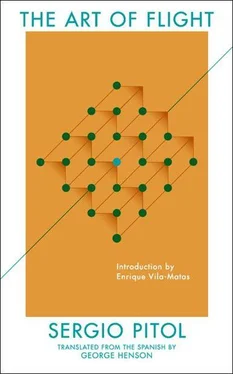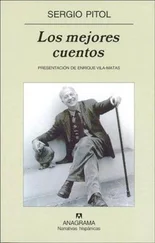Sergio Pitol - The Art of Flight
Здесь есть возможность читать онлайн «Sergio Pitol - The Art of Flight» весь текст электронной книги совершенно бесплатно (целиком полную версию без сокращений). В некоторых случаях можно слушать аудио, скачать через торрент в формате fb2 и присутствует краткое содержание. Год выпуска: 2015, Издательство: Deep Vellum, Жанр: Современная проза, на английском языке. Описание произведения, (предисловие) а так же отзывы посетителей доступны на портале библиотеки ЛибКат.
- Название:The Art of Flight
- Автор:
- Издательство:Deep Vellum
- Жанр:
- Год:2015
- ISBN:нет данных
- Рейтинг книги:5 / 5. Голосов: 1
-
Избранное:Добавить в избранное
- Отзывы:
-
Ваша оценка:
- 100
- 1
- 2
- 3
- 4
- 5
The Art of Flight: краткое содержание, описание и аннотация
Предлагаем к чтению аннотацию, описание, краткое содержание или предисловие (зависит от того, что написал сам автор книги «The Art of Flight»). Если вы не нашли необходимую информацию о книге — напишите в комментариях, мы постараемся отыскать её.
The first work in Pitol's "Trilogy of Memory," The Art of Flight imaginatively blends the genres of fiction and memoir in a Borgesian swirl of contemplation and mystery, expanding our understanding and appreciation of what literature can be and what it can do.
The Art of Flight — читать онлайн бесплатно полную книгу (весь текст) целиком
Ниже представлен текст книги, разбитый по страницам. Система сохранения места последней прочитанной страницы, позволяет с удобством читать онлайн бесплатно книгу «The Art of Flight», без необходимости каждый раз заново искать на чём Вы остановились. Поставьте закладку, и сможете в любой момент перейти на страницу, на которой закончили чтение.
Интервал:
Закладка:
Gabriel will discover from personal experience that the same functions of representation and the same to-and-fro between being and seeming that so unsettles comedians is repeated at Court, only there the reality of being gradually atrophies, while the function of seeming, of pretending, grows disproportionately larger. Court life requires a permanent ability to make believe. Its ceremonies become a never-ending performance that demands more complex dramatic talents and more stylized techniques than those required on the stage. One acts there not only in the performance of protocol, but also in the royal chambers, in the visits that the courtiers pay to each other in their respective palaces, in the theater, the bullfights, in walks in the countryside and, above all, in the passageways where they pretend to be who they are not, when they attend de ocultis the dinners of the fashionable comedians and bullfighters of the day, the popular dances and festivals, or even less desirable establishments where it was possible to rub elbows with the picaresque of every stripe that flourished in the slums of Madrid.
Living at the service of comedians or being a page in the palace precincts means participating in a perpetual representation, pretending to perform one activity when, in fact, one performs another. In the first chapter of The Court of Carlos IV , the young Araceli describes a heterogeneous list of duties that he must fulfill that constitutes in itself a delightful passage of local color. Among them, there are two that are mere affectation: “To walk out on the square of Santa Ana, pretending to look into the shops, but in reality listening with covert attention to what was being said in the knots that collected there of actors or dancers, and trying to discover what those of la Cruz theatre had to say against those of el Príncipe”; the other: “To call every day at the house of Isidoro Máiquez under pretext of asking him some question with reference to the dresses in the play; but, in reality, to ascertain whether a certain person happened to be with him — whose name I reserve for the present.” That is, to feign one interest when the real interest is another, a quite despicable one, I might add; to hear what is being said on the street only to repeat it later to a master; to ask something trivial about a garment when in fact the intention is to discover who is visiting whom, how those being observed carry themselves during the visit, what they talk about. They are of course the activities of an informant, a cop, a spy. Another mandatory activity was “to frequent the gallery of the theatre de la Cruz in order to hiss The Maidens’ Consent , a play that my mistress held in at least as much aversion as the others by the same author”—a provocative activity that complemented that of being a spy. The role of a page at court was very similar, exalted not only by the majesty of the settings and the rank of the protagonists but also by the cruelty of the measures the page must employ. The Countess Amaranta casts a spell over the callow Andalusian whom she invites to be her servant. She offers him the acquisition of a bright future as long as he becomes her slave. His astonishment will disappear within a few days, as soon as the Countess gives him his first instructions. To begin with, she will place him in another home from where he must inform her of everything that happens. Even if this arrangement shocks him, he will continue to be her page. Confident of the spell she exerts over the boy who was plucked from González’s home and carried off to the Escorial, Amaranta launches a far-reaching plan that will solve her problems forever. His role would consist of observing from behind tapestries or curtains, listening behind doors, winning the hearts of the handmaids of the ladies-in-waiting and of the ladies themselves, to obtain secrets of all kinds and become a major power in the Palace. By then, the Countess would secure for him letters patent of nobility; once titled, and with her help, he would enter the Royal Guard. Her power would become extraordinary: “A guardsman has indeed an advantage which princes themselves have not, for while these know nothing beyond the palace they live in — which is the reason why hardly any king governs well — the soldier is equally familiar with the palace and the street, the folks outside as well as those within; and this more general knowledge enables him to make himself useful to all parties and to pull the wires of a vast number of springs. A man who knows what he is about here is more powerful than all the potentates on earth; he can make his influence silently felt to the uttermost ends of the kingdom without its ever being suspected by those who give themselves such airs, calling themselves ministers and councilors.”
The fate assigned to Gabriel Araceli, that of becoming one of the future redeemers who would reclaim Spain, who have arisen from almost nothing — or, in his case, from absolutely nothing — prevents him from accepting the career of indignities proposed by the Countess. Again and again, he will place ahead of her and other members of the nobility the obligations that his honor and dignity require, even if at every turn he is met with hurtful and bitter comments in return. Honor and dignity are attributes characteristic of a gentleman, not of an insignificant louse who dares to claim them for himself. However, unwittingly and by chance, Gabriel will continue to find himself in situations that will allow him to hear terrible secrets, compromising not only for certain people but also for the affairs of the Crown; he will learn the contents of letters and messages that could cost very important persons their life and liberty; he will witness scenes concerning the security of the kingdom. It goes without saying that Galdós will not allow his creation to obtain any personal benefit from such secrets.
Many of Gabriel’s duties in service to Pepita González were, not surprisingly, closely related to the theater. One, already mentioned, was to campaign against The Maidens’ Consent; another, “to accompany her to the theatre, where it was my part to hold the sceptre and crown till she came off after the second scene of the second act in The False Czar of Muscovy to reappear transformed into a queen, to the utter confusion of Orloff and the magnates who had supposed her to be an itinerant tart-seller.” It was also his duty “every afternoon to take a pot of leftover stew, crusts of bread, and other scraps of food to Don Luciano Francisco Comella, a dramatist whose plays until recently had been much celebrated, who was always starving in a house on the Calle de la Berenjena, with his hunchback daughter, who helped him in his dramatic work.” Galdós digresses at every turn on theatrical topics, sometimes insignificant, others of greater importance, such as the battle waged by the neoclassicists against the verbal diarrhea and tacky scenery of the theater of the time, a trend led precisely by Comella, the author, among other rubbish, of All Lost in a Day for a Mad and Blind Love and The False Czar of Muscovy , which had earned Pepita standing ovations in the past. This astracanada theater felt threatened by the loathsome dramatic unities postulated by an equally loathsome Moratín. But let us return to the first question: why begin the history of the palace conspiracy with the premiere of The Maidens’ Consent , which took place two years before?
Miguel de Cervantes scatters throughout the Quixote a wide range of authors’ names and book titles. This reference is not intended to boast of the author’s culture. These cultural references are there because they play a decisive role in the narrative structure: they support the protagonist’s motives and the mad ideas; they determine the profile of other characters; and they allow stylized mirror games, such as comparing a work in progress: the very history of the hidalgo of La Mancha, to its fake derivations, such as Avellaneda’s apocryphal Quixote. Playing with other books infuses a new style into the art of storytelling and demonstrates the relationship of the novel with the Renaissance culture that surrounds it. Cervantes’s eagerness to intertextualize had few successors in Spanish narrative. Galdós is one of the few writers in our language who employed and renewed this device. The war Luciano Comella and his followers wage against Fernández de Moratín is without a doubt the transplantation of a struggle between the old and the new that is beginning to insinuate itself in Spain. The brutal struggle between playwrights is a kind of first call in the debate between a stagnant and incoherent culture and the effort to establish the order and the task of tidying up in every corner of the kingdom. The fact that Moratín’s work deals with the education of society, and women in particular, appears as a response to that frenzied court where the majority of its members are not educated at all, and where the only roads available to arrive at a goal are pretense and intrigue. That exercise of intertextuality may precede the same diegesis of the Episodes . The device allows Galdós to avoid sinking into long didactic explanations, the very kind that renders so many of his contemporaries’ works unreadable. By listing Pepilla González’s readings, her omissions and literary shortcomings, Galdós is able to provide us, for example, with perfect subtlety, the image of her person, more powerfully than would have been possible in a store of pages that contain an infinite number of details about her habits, virtues, and weaknesses. Gabriel Araceli comments — and here we sense again the voice of the former narrator, not that of the page, who could scarcely translate his feelings in such a learned way — that the actress was not known for her good literary taste, among other reasons because whoever approached her always had Ovid and Boccaccio in mind rather than Aristotle. A remarkable way of saying everything, without going into details.
Читать дальшеИнтервал:
Закладка:
Похожие книги на «The Art of Flight»
Представляем Вашему вниманию похожие книги на «The Art of Flight» списком для выбора. Мы отобрали схожую по названию и смыслу литературу в надежде предоставить читателям больше вариантов отыскать новые, интересные, ещё непрочитанные произведения.
Обсуждение, отзывы о книге «The Art of Flight» и просто собственные мнения читателей. Оставьте ваши комментарии, напишите, что Вы думаете о произведении, его смысле или главных героях. Укажите что конкретно понравилось, а что нет, и почему Вы так считаете.












